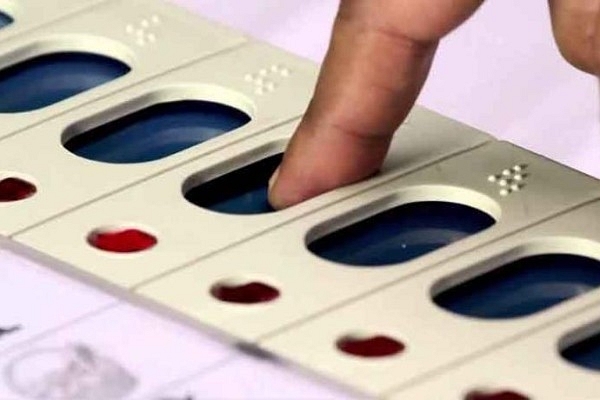News Brief
Explained: Nagaland MLAs Disqualification And Recent Trend Of Judicial Activism In Anti-Defection Law

An EVM machine
The Kohima Bench of Gauhati High Court has directed Nagaland Assembly Speaker to conclude the disqualification proceedings against seven MLAs of the opposition party Naga People’s Front (NPF) and pass appropriate orders within six weeks from 2 June.
The Manipur High Court is set to hear a similar disqualification case on Friday. Once an order is passed, the Speaker is expected to give his judgement regarding the disqualification.
Ahead of 2019 general elections, seven NPF MLAs had given written declarations that they would back the consensus candidate of ruling People’s Democratic Alliance which includes the Bharatiya Janata Party (BJP).
The NPF party leadership claimed that this constituted the seven MLAs willfully giving up their party membership. On the other hand, the MLAs claimed that the NPF’s decision to support the Congress candidate was “against the principle of regionalism” and hence, they supported the PDA candidate.
In Manipur, seven Congress MLAs had gone to ruling BJP over a period of time, attracting petition for disqualification.
How are MLAs disqualified?
The provision for disqualification was introduced in the Constitution in 1985 as the Tenth Schedule.
This was done to prevent the MLAs shifting allegiance swiftly narrow political interests, money etc. A popular example if of the legislator Gaya Lal who reportedly changed his allegiance three times in a single day in 1967.
The MLAs either left the parties they were in at the time of election or went against the parties’ decisions over critical issues, for example, voting on an important bill.
In a multiparty democracy, this caused destabilisation of the governments, corruption, betrayal of people’s mandate, and political parties busy in eyeing each others MLAs, guarding their own instead of focusing on governance.
Under Tenth Schedule, a member of the House is disqualified if he “voluntarily gives up the membership of such political party” or votes or abstains from voting contrary to the directive of the respective political party.
The law was further strengthened in 2003 with the 91st amendment when the exemption from disqualification in case of splits with at least one-third of members was removed.
The Amendment also ensured that a legislator disqualified for defection was not appointed as a government Minister or to any remunerative post from the date of his disqualification either till the expiry of his term of office or till he was re-elected to the legislature, whichever is earlier.
Currently, a merger with another political party with at least two-thirds of the members of the first political party is exempted.
Tenth Schedule also states that Speaker (Chairman in the case of the upper house) shall be the ultimate decision making authority in case of any disqualification arises.
The role of the Speaker
The role of the Speaker becomes crucial as it has been given sweeping powers in the cases of disqualification.
Unlike United Kingdom, where the Speaker has to resign from the membership of the political party to maintain bipartisanship, in India, the Speaker remains a member of the political party.
Since the Speaker is elected by the Lok Sabha, she generally belongs to the ruling party. This raises the accusations of political bias.
In many cases, the Speaker delays accepting resignation of the members and bides time till they are seen as ‘voluntarily giving up the party membership’ and therefore, can be disqualified.
Both resignation and disqualification have the same effect on the strength of the House, but unlike a resigned candidate, a disqualified candidate cannot be made a minister or given any remunerative post unless re-elected to the House.
The Speaker can also arbitrarily decide on the ‘voluntariness’ of the resignation even when given by the legislator himself in the correct format. There is no guarantee that the accused members will be given sufficient opportunity before disqualification.
Recent trends
While the Tenth Schedule bars any court jurisdiction in case of disqualification, the High Courts or Supreme Court can still intervene as Judicial Review was deemed as a part of the basic structure of the Constitution in Kesavananda Bharati case.
As political parties continue to twist the law to suit their needs, ultimately the issue lands in the lap of the court which has to disentangle the web of confusion.
The courts have shown much more activism in recent times in the matters of disqualification.
In the same judgment, the court set three months as the outer limit for the Speakers to conclude the defection proceedings.
The Election Commission of India in the past had recommended that instead of the Speaker, the disqualification of the legislators should be done by President or Governor on the advice of the Election Commission.
One reason defection remains attractive is that there is no restrictions on the disqualified legislator with regards to re-election.
In the Karnataka case, the Supreme Court struck down the Speaker’s decision to bar the disqualified legislators from membership of the house for the remaining term. The disqualified candidates contested the by-polls and came back.
Introducing ElectionsHQ + 50 Ground Reports Project
The 2024 elections might seem easy to guess, but there are some important questions that shouldn't be missed.
Do freebies still sway voters? Do people prioritise infrastructure when voting? How will Punjab vote?
The answers to these questions provide great insights into where we, as a country, are headed in the years to come.
Swarajya is starting a project with an aim to do 50 solid ground stories and a smart commentary service on WhatsApp, a one-of-a-kind. We'd love your support during this election season.
Click below to contribute.
Latest